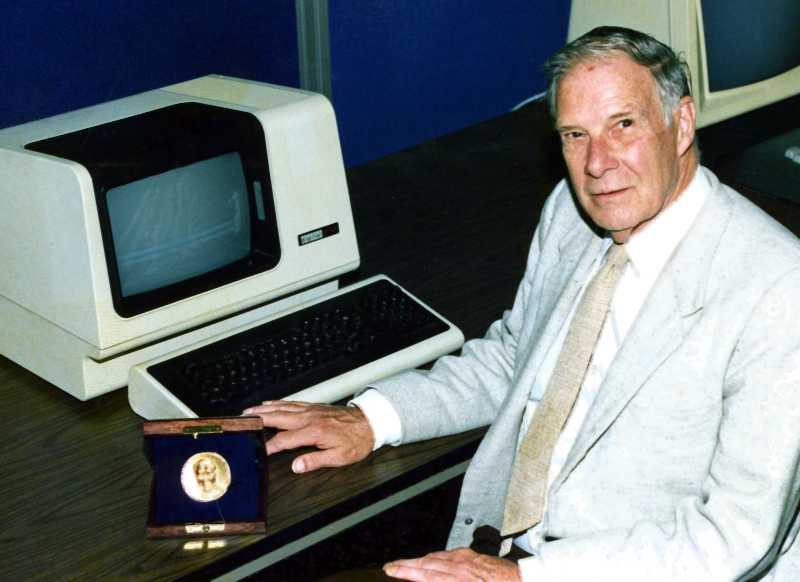 You may not know the name [Richard Hamming], but you definitely use some of his work. While working for Bell Labs, he developed Hamming codes — the parent of a class of codes that detect, and sometimes correct, errors in everything from error-correcting memory to hard drives. He also worked on the Manhattan Project and was a lecturer at the Naval Postgraduate school.
You may not know the name [Richard Hamming], but you definitely use some of his work. While working for Bell Labs, he developed Hamming codes — the parent of a class of codes that detect, and sometimes correct, errors in everything from error-correcting memory to hard drives. He also worked on the Manhattan Project and was a lecturer at the Naval Postgraduate school.
Turns out [Hamming] has an entire class from the 1990s on YouTube and if you are interested in coding theory or several other topics, you could do worse than watch some of them. However, those videos aren’t what attracted me to the lectures. As the last lecture of his course, [Hamming] used to give a talk called “You and Your Research” and you can see one of the times he delivered it in the video below. You might think that it won’t apply to you because you aren’t a professional academic or researcher, but don’t be too quick to judge.
Turns out, [Hamming’s] advice — even by his own admission — is pretty general purpose for your career or even your life. His premise: As far as we know, you have one life to live, so why shouldn’t it be a worthwhile one by your definition of worthwhile.
Along the way, he has an odd combination of personal philosophy, advice for approaching technical problems, and survival skills for working with others. If you are in the field, you’ll probably recognize at least some of the names he drops and you’ll find some of this technical advice useful. But even if you aren’t, you’ll come away with something. Some of it seems like common sense, but it is different, somehow, to hear it spoken out loud. For example:
If you don’t work on important problems, it’s not likely that you’ll do important work.
One piece of technical advice? Don’t waste time working on problems you have no way to attack. He points out that anti-gravity, time travel, and teleportation would be very lucrative. But why work on them when there appears to be no way to even remotely accomplish them today. Well, at least when he said that. There has been a little progress on a form of teleportation, but that wasn’t what he was talking about anyway.
While not a hack in the traditional sense, examining your life, career, and technical research to improve your own effectiveness is something to take seriously. We were hoping he would throw in a joke about error-correcting your career, but unless we blinked, no such luck.
Hamming’s work on block codes was followed about ten years later by the Reed-Solomon code which is found nearly everywhere now. Hamming is also associated with the term “hamming distance,” something we talked about when discussing Gray code.
















More like simulate the effects of anti-gravity than actually making gravity into a repulsive force.
Speaking of “important” things, is reminds me of a line in a German documentary about the history of radiotelegraphy that I once heard. If I remember, correctly, it went like this. :
“German writer Thomas Mann, who was on a trip (by ship) to America, was annoyed by the constantly repeating news (over radio) about an intoxicated zoo tiger.
In a letter to a friend he wrote:
“A technical marvel like radio telegraphy must serve
to carry such nonsense over land and waves .. Oh mankind ..
Their spiritual and moral progress had not kept pace with the technical.
It is left far behind.””
And I can’t help, but must agree. There are a lot of good people (I believe in humanity), but also “stupid” ones. Especially those who think that their work is more important than anything else. What I hope for is that human society keeps evolving its humor, its empathy and its mental horizon. Technology as such is not the culprit, I think.
About 50 years ago people landed on moon with a very primitive apparatus. It’s the mind set that matters. In the 1960s/1970s, for a short period, humanity understood this with its “mind over matter” spirituality/mentality. Now we’re back to pure materialism. It’s perhaps just me, but I think that a bit of phantasy/spirituality helps us to solve certain riddles that a pure analytical approach can’t. :)
What’s this “we” business, paleface?
And today you have twitter and many other possibile forms to carry similiar nonsense over land and waves and beyond . Probably that’s exactly what mankind needs, ever thought about that ?
;)
Clickabait!
Anti-gravity, time travel, and teleportation: Dr. Hamming gives advice:
“Just don’t do it.”
Of course, it’s not quite what he said. He said that you might have 10-20 problems you’re thinking about, but the ones that you should focus on are the ones that you have some way to attack. He said that the “importance” of a problem (to you) should be judged first according to whether you’ve got a way to attack it, not by the possible consequences of solving it.
My interpretation: you can think about anything you want as a side-task, but your main task needs to be a problem you can solve.
And precisely how do you determine a problem is solvable or not?
Effectively, it comes down to, if you already have a solution in mind, then it’s solvable. If not, don’t bother. I really hate these “old moderately successful guy gives tired speech to captive audience” pieces. I’d like to hear more “I did everything right, and came up with shit, and still found value in my life” stories. He actually spouts the old, “If I could do this, so can you” stream. As if he believes it.
Okay, “solve” wasn’t a good choice of words for my part. Like Hamming said, you need to have some way to “attack” the problem. Having a way to attack it doesn’t mean it’s solvable, but it just means that there’s an unexplored question that you have some way of investigating.
Yeah I felt a little deceived reading this one. I thought “oh, this will be interesting” and then I got to the end and realised that it had nothing to do with the topics in the headline.
i thought the headline was just right, especially as he does give advice on pursuing such endeavours and found the video enjoyable.
I like the terminal he is using ;-)
I was so happy when they carted the VT52s away and replaced them with VT100s, I could kick back in my chair with the keyboard in my lap! but I did prefer the lovely sound on the VT52 for key clicks and ^H, made by buzzing a mechanical relay.
He’s just hamming it up.
Hamming is better known to me for his data sampling window.
Time travel ?…. It’s a wibbily wobbily timey wimey thing…..
Reverse the polarity of the neutron flow.
That cracked me up when I heard it.
+1
Fascinating, how that list of technologies we don’t need to spend time on is equal to the list of technologies that potentially could help us to escape or get independence from the authorities.
Add FTL and independent power source powerful enough to really go off-grid to the list. :)
The technologies allowing you to escape or get independence from the authorities are exactly technologies which require authorities in order to be invented and manufactured. And if you would escape, you’d be bored and lonely. None around to applaud you. Or you’d become a tyrant of your own domain, a.k.a the authority around thereabout.
By “invented” I meant “researched”
Anti-Gravity crafts have existed for a hundred years, they are known as Rockets…..shhhh
Or old-school: Rocks, spears, arrows. Anti-gravity for 50% of their parabola!
Just like the Starship series… anti-gravity most of the flight then they come down and go BOOM !
Thanks for letting us know about Richard Hamming’s talks. I plan on watching them.
This video series hosted on Youtube is another example why Youtube is so GREAT.
this reminds me…maybe someone can help.
i’m looking for a document i found a long time ago. it’s a phd dissertation that is a good in depth primer on signal theory, the question of whether information is present (discernable/recoverable) in a system at all. the dissertation started at the absolute beginning of the field. i wasn’t ready for it at the time but i’d like to read it now.
i stumbled across it some years ago when i was trying to find out how RAID5 works (which has a nice and simple answer that doesn’t require such detailed knowledge of signal theory). some website somewhere recommended it specifically as a thorough introductory text, and provided a convenient direct link to the 100+ page document.
it was someone famous in the field, either hamming, reed, solomon, gray, or someone on that level. i guess that’s enough hints i should be able to narrow it down myself but i wonder if someone else won’t recognize what i’m asking for :)
thanks!
hah! asking was enough to make me find it. it is not quite as i described but i think i was thinking of Claude Shannon’s A Mathematical Theory of Communication.
https://en.wikipedia.org/wiki/A_Mathematical_Theory_of_Communication